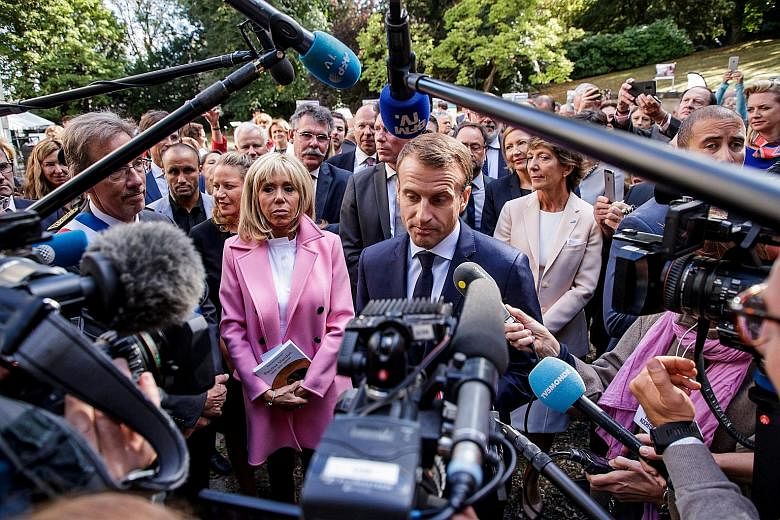CIVRAY (France) • If the French were willing to give Mr Emmanuel Macron a chance for a time, that time appears to be running out.
In a spate of recent polls, the President has dropped so sharply in popularity that he dipped even below his much-derided predecessor, Socialist Francois Hollande.
A poll released last week showed Mr Macron's approval rating at only 19 per cent, while 60 per cent found his achievements "negative", nearly double the figure six months ago. The poll was carried out by Kantar Sofres Onepoint group for French media.
The town of Civray in central France, which had voted Socialist before, was among the many that took a chance on the wunderkind former investment banker. Operating outside the established political parties, Mr Macron swept to power 17 months ago at age 39, imploding France's ossified politics amid a yearning to move the country out of years of economic stagnation.
Today, Civray - a town of just a few thousand people - and its environs demonstrate the widespread souring of opinion on Mr Macron.
Its representative in Parliament was one of the first to break openly with Mr Macron's political movement. Conversations across this emblematic region amount to a buffet of disillusionment.
"In the beginning I thought, 'Yes, he's young, he's dynamic'," said Ms Anais Bonetat, 22, a waitress in nearby Montmorillon. "But really, now, I see he's just doing it his way, without even asking us."
Mr Macron's descent may hold broader dangers for liberal democracy in Europe at a time when the French President - with his pro-free trade, pro-Europe policies - has set himself up as the opposing pole to the forces of nativism tearing at the European Union.
The far-right Rassemblement National, formerly the National Front, waits in the wings, polling a close second to Mr Macron's movement before elections for the European Parliament next year.
"I'm fearful that the extremes will have the wind in their sails," said Mr Michel Pain, Mayor of the nearby Saint-Maurice-la-Clouere.
A series of mini-scandals this summer - an aide was caught on video hitting a protester, while another video found Mr Macron admonishing ordinary citizens who accost him - has not helped the President.
But the problems are about more than just image; they are substantive. The overwhelming feeling is that Mr Macron's pro-market reforms - lightening a protective labour code, largely doing away with a wealth tax, ending favoured status for the country's railway workers - have so far not improved the lives of ordinary French people.
Instead, those in the broad economic and social tiers below the elite complain that they are paying the price as Mr Macron makes France more capitalist.
Despite 11/2 years of reforms, the jobless rate hovers at over 9 per cent. The economy is growing at a meagre rate of around 1.7 per cent.
Mr Macron's defenders say that his agenda is for the long haul, and that it is too soon to pass judgment. "We didn't say that we were going to change the country in a year and half," said Mr Stanislas Guerini, a lawmaker from Paris who is a spokesman for Mr Macron's movement, The Republic on the Move. "If we really want to change the country deeply, we've got to take the time to undertake deep reforms," Mr Guerini said.
Meanwhile, the French government yesterday said pensions and welfare benefits will be shaved further in the 2019 Budget, while 4,100 more public sector jobs will be axed as Mr Macron aims for a deficit of 2.8 per cent of GDP, below the 3 per cent limit set for EU members.
But there will also be a combined €20 billion (S$32 billion) of tax cuts for businesses and €6 billion in tax relief for households, including a gradual end to an annual housing tax.
NYTIMES, AGENCE FRANCE-PRESSE

